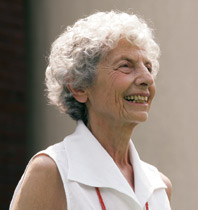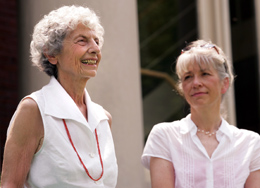Your Page

The Bates chimes call; black-robed seniors come billowing over the sun-laced lawns to Baccalaureate. “Hello, Dean Isaacson,” they greet me warmly. A burly football player averts his gaze; I had brought him to Student Conduct Committee once.
From all directions comes streaming a festive crowd of parents, some holding children by the hands. How many future Batesies among them? I smile in anticipation before I realize that I won’t be here to welcome them.
The faculty appear, singly or in pairs, their black gowns winging behind them. Here and there the vivid blue of Yale and the scarlet of Harvard enliven the scene, like the blue jays and cardinals in my garden. A young instructor breaks his long strides, allowing me to catch up with him. “What are your summer plans, Judith?” he asks me routinely. “Research and writing,” I reply, without revealing my topic. My memoirs on the Holocaust may come to naught, I figure.
He starts describing his research with great enthusiasm, but stops stock-still at a majestic elm. “Look at that contraption, will you?” he fumes, pointing at the half-filled bottle clinging to its trunk. “What are these tubes dangling from it?”
“Intravenous feedings,” I laugh it off.
“A waste of resources, if you ask me,” he bristles. “Tell me, Judith, what’s more important, saving these old trees, or establishing a new major in Far Eastern studies?”
“Why don’t you ask the president,” I suggest, glad to have such puzzles behind me. He joins the faculty ranks assembling by our hewn-stone chapel while I mingle with the seniors. I’m listening to their latest plans, jobs, graduate schools, weddings, and the Peace Corps, but furtively, I must check for shoes.
I see myself marching in a mile-long procession, at Auschwitz-Birkenau, stark naked.
“No one came barefoot,” I report to President Reynolds, as he starts our stately procession through the Chapel doors. He carries his presidential paraphernalia with great dignity, his head held high, his steps springy. I am proud to be following just behind him, but still incredulous of my position. What right have I, the ultimate outsider, to be playing this venerable role?
My mind, that relentless time machine, projects a different image. Instead of stepping along the carpeted aisle in my academic gown, cap and hood, I see myself marching in a mile-long procession, at Auschwitz-Birkenau, stark naked.
How will anthropologists of future generations analyze our age? “In the 20th century,” they might report, “people would save individual trees with utmost effort while annihilating each other by the millions.”
As we proceed toward the platform, accompanied by melodious organ music, here and there a parent nods with a smile of recognition, and I risk the solemnity of the occasion by smiling back, just as I did at my daughter’s wedding.
Mounting the steps to our splendid dais, I take my seat on a finely carved chair, flanked by the chaplain, the president, and the dean of the College. Conscious of being the only woman on the platform, surreptitiously I adjust my academic gown to fall safely below my knees. The men have it easy, as usual.
This is my next-to-last official function at the College. After tomorrow’s Commencement, I’ll be embarking on a new venture, just like the seniors.
How many times have I started anew? I muse, as my eyes follow the members of the Class of 1977 making their solemn way to the front pews. How many different identities have I had?
Judit Magyar — a family name meaning Hungarian.
Jewish teenager under the Nazi regime.
Number 561.20578 in concentration camps.
Frau Hauptman, American captain’s wife in Germany.
Mrs. Irving Isaacson, lawyer’s wife in Lewiston, Maine.
Mom, to my children.
Judy, to my classmates.
Mrs. Isaacson, to my math students.
Dean Isaacson for the past eight years.
Will Grammi be next? Here is hoping.

Judith Magyar Isaacson '65 receives the Sesquicentennial Prize as President Hansen looks on.
The organ music gives way to expectant silence, and my eyes follow the chaplain approaching the pulpit. At his expressive hand signal, the seniors bend their heads in silent prayer. Our fears of bare feet seem absurd.
As the program proceeds in its age-old manner, I feast my eyes on tomorrow’s graduates, bidding my silent goodbyes to them. I’ll miss them all, even that burly football player.
Judith Isaacson received the Sesquicentennial Prize at Reunion 2005. Of Auburn, she is Bates’ former dean of students and author of the acclaimed Seed of Sarah: Memoirs of Survivor. A native of Hungary, she survived the Nazi concentration camps Auschwitz-Birkenau and Hessisch Lichtenau.